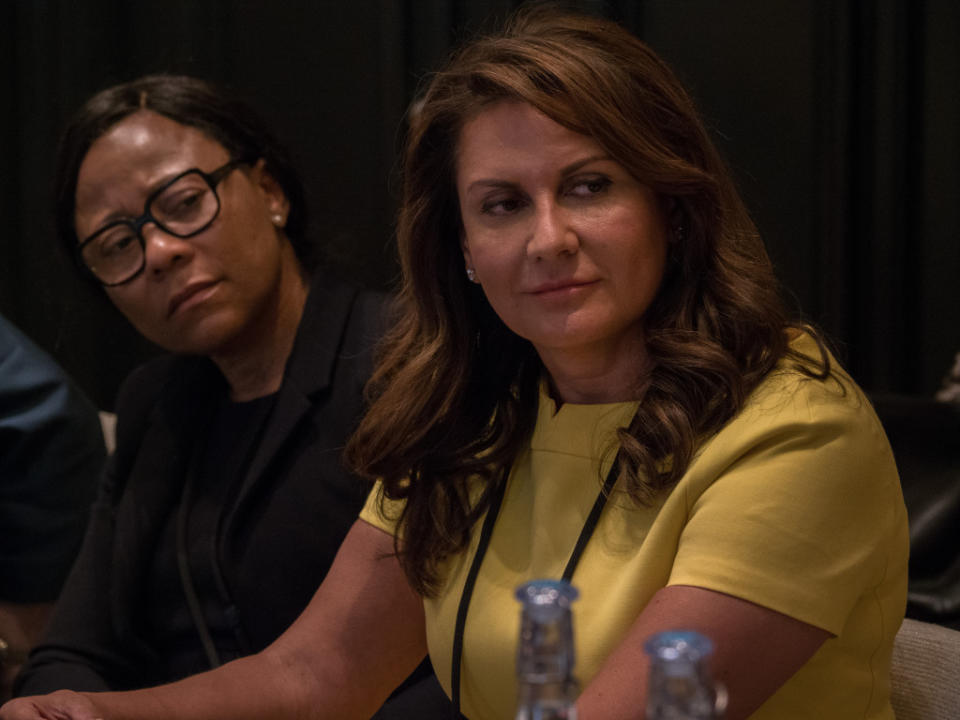Millennials and President Trump Are Making Companies Better Corporate Citizens
Pretty much any major corporation will tell you they're accountable to more than just shareholders these days. They also say--whether it be due to genuine concern, a bid to protect reputation, or a business-savvy appeal to millennials--that they answer to society, and they're accordingly pursuing more sustainable ways of doing business.
Gabriela Ramos, chief of staff and sherpa to the G20 for the Organization of Economic Cooperation and Development, says this is how it should be. "The reality is, the challenges we're facing call for a joint effort of public and private sectors--everyone who can contribute needs to contribute," she said, speaking at Fortune's Most Powerful Women International Summit in London Tuesday afternoon. Ramos, who had recently returned from a "discouraging" G-7 conference, noted that globalization has not delivered prosperity to everyone. Beyond its winners, the internationalization of the economy has bred inequality, distrust in institutions, and a toxic political environment. She says this less-than-ideal status quo presents the "business case for sustainable ways of growing."
Sheila Patel, CEO of International Asset Management, said the financial sector is increasingly on board with this mission. Beyond the reality Ramos outlined, Patel noted that becoming a model corporate citizen has become an imperative for businesses operating in the age of the purpose-driven Millennial. "There's a trend coming, and people in our industry have to be ready for it," she said, adding, "There's a huge transfer of wealth [underway] coming to women and to Millennials."
She has noticed an uptick in demand for socially responsible investment products and companies. "It's completely different how these groups want their money invested, and if you don't have opportunities for them to invest in sustainability, you'll miss the next wave."
Sign up: Click here to subscribe to the Broadsheet, Fortune's daily newsletter on the world's most powerful women.
Some attending the session noted that social media has accelerated this trend as it forces companies to be far more transparent about their business activities and far more vigilant in managing their reputation; to remain in consumers' good graces, they can't do anything wrong. Others mentioned governments--particularly America's, which backed out of the Paris Climate agreement and has expressed skepticism about climate change--have left a wide open void for companies to fill.
Anne Finucane, vice chairman of Bank of America--she also heads up the bank's Environmental, Social and Governance Committee--said the change in corporate sentiment over past three years has been dramatic; she compared rallying interest in sustainable growth a decade ago to "pulling on a string."
While most in the audience agreed that businesses had recently become better corporate citizens--many volunteered examples of the efforts their own companies were making--Patience Wheatcroft, a member of Great Britain's House of Lords, argued corporations remain "schizophrenic" on the issue of social responsibility and that they have a long way to go.
"On the one hand, they'll embrace all sorts of sustainability and community events. On the other, they're indulging in algorithmic trading, short-selling of stock--the absolute opposite of long-term sustainability," she said. Wheatcroft added that neither financial institutions nor major corporations have done much to address the issue of executive compensation, which she noted was "really causing problems in both the States and Europe because it's patently unfair."
She continued, "Because the people in the bottom, and even the middle, have suffered for the last 20 years. That's why [the US] got Trump and [the UK] got Brexit. People feel very hard done by --because no matter how much we talk about it there is no sign at all this is being addressed by businesses."
See original article on Fortune.com
More from Fortune.com


